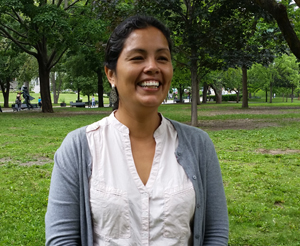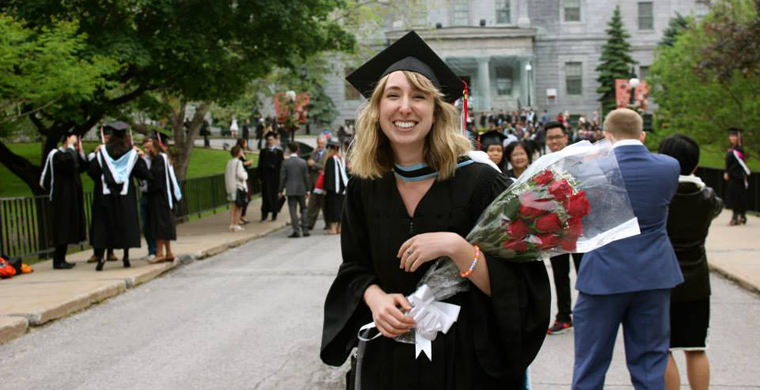Sylvia Kokunda, a Batwa surveyor and research assistant to the IHACC project, was invited to speak about the Batwa plight to the United Nations Permanent Forum on Indigenous Issues in New York City. Sylvia was the first Batwa woman from the Bwindi region to attend secondary school and earn a university degree. She now works with the Batwa Development Program as agriculture manager for the Batwa. To find out more about Sylvia's experience, click here to read her featured story in the Kellermann Foundation's news letter.
Perceived causes of diarrhea for Indigenous Peruvian Shawi
Rebecca Wolff, an undergraduate honours student from the University of Guelph working with IHACC, has returned to Peru to begin sharing and validating her research results. To facilitate the process, Rebecca has created results dissemination booklets for government and non-government stakeholders, and a poster for each household in the communities she worked with, both of which are displayed below. We wish Rebecca the best of luck!
Carol Zavaleta successfully passed her comprehensive exams
 We would like to congratulate Carol Zavaleta, now a PhD Candidate, on her successful completion of the comprehensive examination process earlier today. Carol is a Medical Doctor, and holds a Master's degree on Control of Tropical and Infectious Diseases from Cayetano Heredia University in Peru. She oriented her clinical and research practice to work with remote rural communities in the Peruvian Amazon, and has interest in the use of social sciences and epidemiology to understand the risks and determinants of health among indigenous people. After her participation as a Peruvian National coordinator of IHACC-Peru in the early years of the project, she found that not only biological, but social and environmental factors need to be understood in order to improve the health situation of native communities. Since 2012, she has moved to Montreal to complete her PhD with the Geographic and Environmental Epidemiology Lab at McGill, her work continuing to contribute to the IHACC project research. Her thesis work focuses on the vulnerability of Shawi Indigenous people to food insecurity in the Peruvian Amazon, and seeks to identify opportunities for adaptation to climate change in this context.
We would like to congratulate Carol Zavaleta, now a PhD Candidate, on her successful completion of the comprehensive examination process earlier today. Carol is a Medical Doctor, and holds a Master's degree on Control of Tropical and Infectious Diseases from Cayetano Heredia University in Peru. She oriented her clinical and research practice to work with remote rural communities in the Peruvian Amazon, and has interest in the use of social sciences and epidemiology to understand the risks and determinants of health among indigenous people. After her participation as a Peruvian National coordinator of IHACC-Peru in the early years of the project, she found that not only biological, but social and environmental factors need to be understood in order to improve the health situation of native communities. Since 2012, she has moved to Montreal to complete her PhD with the Geographic and Environmental Epidemiology Lab at McGill, her work continuing to contribute to the IHACC project research. Her thesis work focuses on the vulnerability of Shawi Indigenous people to food insecurity in the Peruvian Amazon, and seeks to identify opportunities for adaptation to climate change in this context.
We look forward to more of Carol's work and wish her the best of luck in the completion of her PhD thesis!
Congratulations to Sierra, Joanna, and Michelle on their graduation!
 On Monday June 1st, three IHACC students from McGill University obtained their degrees at the Spring 2015 Convocation Ceremony. We would like to congratulate Sierra Clark (B.A. Geography Honours, Supervisor: Dr. Lea Berrang-Ford, Research location: Uganda), Joanna Petrasek Macdonald (M.A. Geography, Supervisor: Dr. James Ford, Research location: Canadian Arctic), and Michelle Maillet (M.A. Geography, Supervisor: Dr. James Ford, Research location: Global) for their success.
On Monday June 1st, three IHACC students from McGill University obtained their degrees at the Spring 2015 Convocation Ceremony. We would like to congratulate Sierra Clark (B.A. Geography Honours, Supervisor: Dr. Lea Berrang-Ford, Research location: Uganda), Joanna Petrasek Macdonald (M.A. Geography, Supervisor: Dr. James Ford, Research location: Canadian Arctic), and Michelle Maillet (M.A. Geography, Supervisor: Dr. James Ford, Research location: Global) for their success.
 To access and read their individual research theses, please click on the links provided below:
To access and read their individual research theses, please click on the links provided below:
Clark, S. (2015) The Burden and Lived Experience of Acute Gastrointestinal Illness in an Indigenous Batwa Population in Southwestern Uganda. Undergraduate Honours thesis. Department of Geography, McGill University.
Petrasek Macdonald, J. (2015) From the minds of youth: exploring Inuit youth resilience within a changing climate and applications for climate change adaptation in Nunatsiavut, Labrador, Canada. M.A. thesis. Department of Geography, McGill University.
Maillet, M. (2015) Is the United Nations framework convention on climate change an effective (or appropriate) institution for supporting indigenous peoples' adaptation to climate change? M.A. thesis. Department of Geography, McGill University.
Anna Bunce presented at the Canadian Anthropological Society (CASCA) annual meeting at University Laval
Anna Bunce presented her work at the Canadian Anthropological Society (CASCA) annual meeting at University Laval in Quebec City last Wednesday. Her talk, titled "Inuit Women’s Berry Picking: Lessons on Gender, Procurement, Well-Being and the Environment/La cueillette de petits fruits chez les femmes inuites: leçons sur le genre, l’approvisionnement, le bien-être et l’environnement" explored the relationships Inuit women have with berry picking across Canada's north based on the findings of her own research along with that of Drs. Martha Dowsley (Lakehead University), and Scott Heyes (University of Canberra). Why has berry picking persisted among Inuit women? What role does berry picking play in the lives and identities of Inuit women? These questions were explored in the Re-Conception of Landscapes Session on May 13th.






